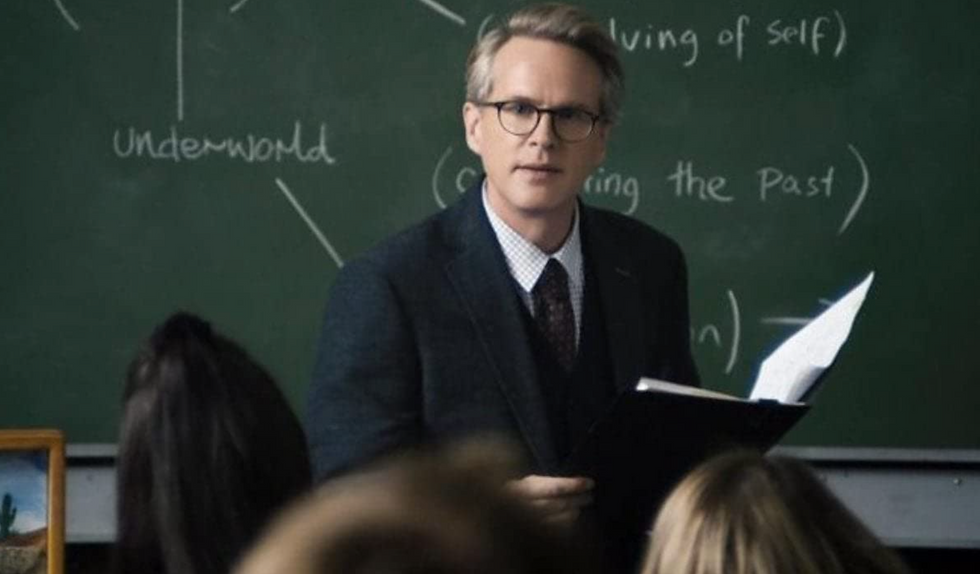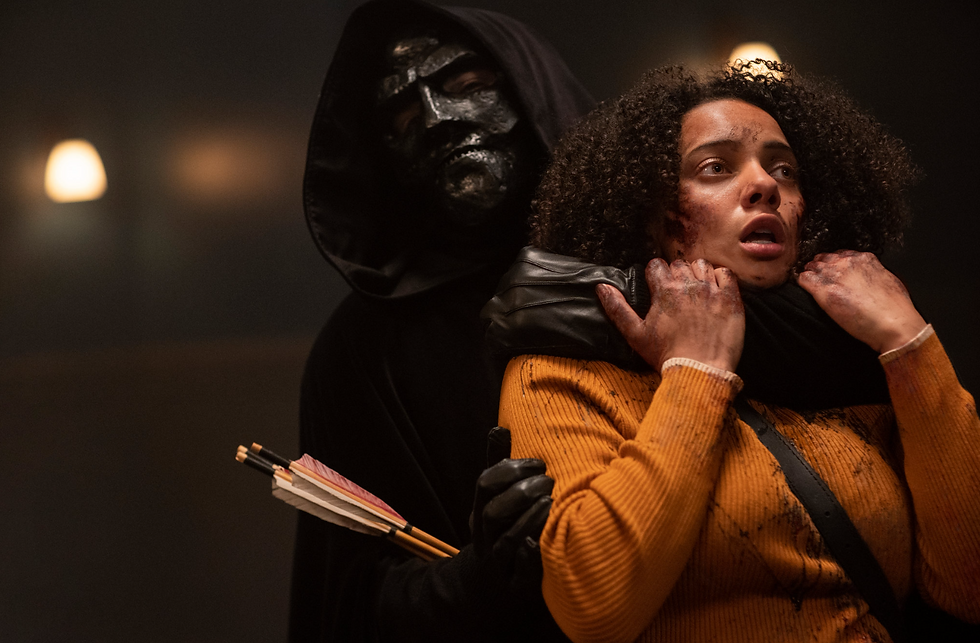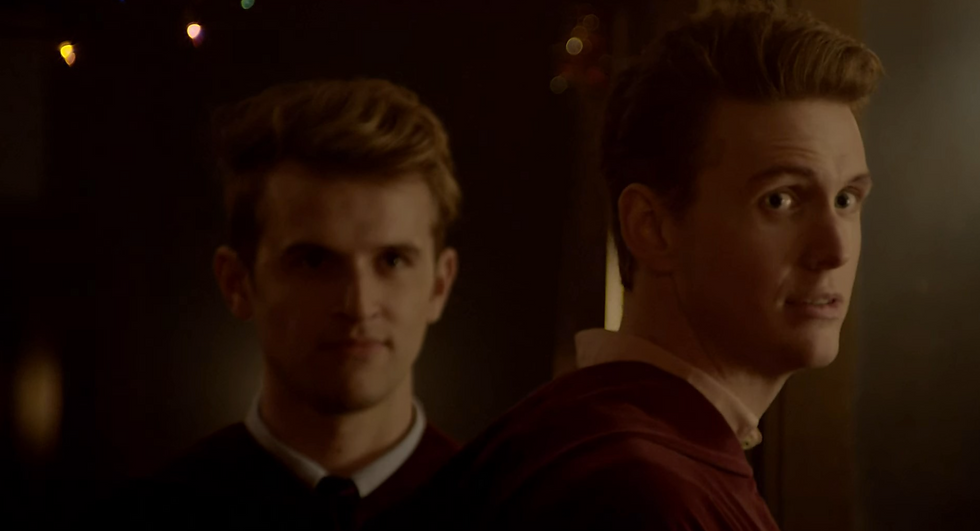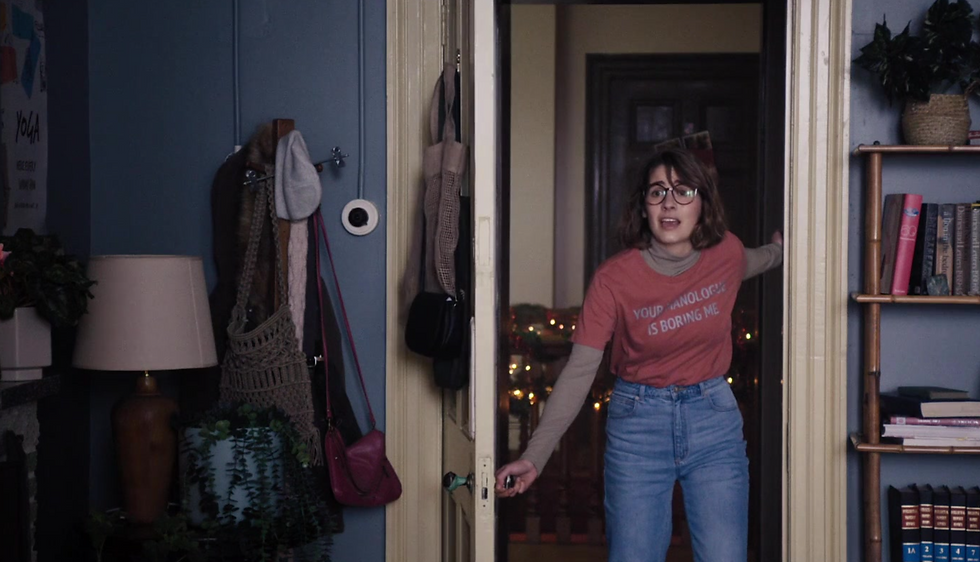Why 'Black Christmas' Is Just What We Need Right Now

You’re walking to your car. It’s dark out. You feel a chill in the air. You think you might hear footsteps behind you. Not the comforting sound of a crowd of people, the sound of safety, but one lone set of footsteps. You start to pick up your pace. You pull your keys from your purse, and hold them in your hands like a low-budget Wolverine cosplay, a trick you’ve heard from other friends and female family members for years, a trick that is apparently not advised by self defense experts. No, this isn’t a memory or a personal anecdote. It’s the beginning of Sophia Takal’s Black Christmas.
The film was so clearly written and directed by women, because it touches upon so many everyday fears and survival strategies that likely wouldn’t even occur to men. Black Christmas is going to piss people off - namely men and conservative women - but we’ll know, through the barrage of hate and fanboy criticism that it’s “not like the original,” that it’s because Takal has hit a nerve.
Many will condemn this movie as a performative piece, capitalizing on the “woe is me” attitudes women have been labeled with since they started coming forward about cases of assault committed by powerful men. But in a society where rape and sexual assault is the least likely crime to be reported, due in large part to the victim’s fear of not being believed, and where our very own president has not only admitted to committing assault but BRAGGED ABOUT IT, it feels almost negligent NOT to include the current climate in the formulation of our movies, even if they are fun, college horror flicks.

I mean, can you imagine making a movie about college women set in present-day and not talking about the ever-looming threat of sexual assault? It’s why we text our friends when we’re going on a date with a new person, or only leave bars in groups. It’s why we have to Lyft instead of walking home alone, late at night. (Although don’t get me started on how unsafe ride-share services have become for women – another risk men likely don’t think twice about.) Black Christmas is a horror movie for the #MeToo age. In as much as a movie can be an anthem, Black Christmas is an anthem for women who, to put it simply, are over it. It is a film for women who are ready to fight back, no matter who believes them.
In Black Christmas, the character Riley (Imogen Poots) has experienced a sexual assault, at a frat house of all places, and – by her friend’s observation – has been shrinking in on herself ever since, thanks in no small part to all of the cops and others on campus who didn’t believe her. She was the one assaulted, and yet it is she who wears the scarlet letter, the embarrassment and shame. And it’s a situation that far too many women can relate to, whether the men in their life know it or not.
The resulting smear campaign (ironic since it’s always the men crying, “you’ve ruined my reputation!”) even affects her education, as the repulsive Professor Gelson (played well – albeit sadly, by my movie crush to end all crushes, Cary Elwes), an advisor for the fraternity that housed the date raper, takes it out on her in class, as well as whenever he sees her on campus.

He also makes his disdain for her friend, Kris (Aleyse Shannon) known, as she had started a petition against him for not teaching any literature written by women, people of color, LGBTQ+ people, etc. His reasoning, that he yells to the class in a misogynist monologue, is that he’s only trying to teach them the classics.
The understood subtext here is that no women, people of color, or LGBTQ+ people ever wrote anything of consequence. Therefore, they can’t be included in a literature class. Kris wisely points out the inherent patriarchy in this, asking “Who decides the classics? Whose classics are they? They’re not mine.” Activist Kris also managed to get a statue of the founder taken down from display on campus, seeing as the man was racist, sexist, and had owned slaves.
Quick note, I found it incredibly problematic that the fraternity was dubbed “The Founder’s Fraternity,” since it was the one the founder of the college had attended. In my experience, the amount of entitlement and power felt by men in any typical frat is unsettling enough, let alone one seemingly marked as “special” or “chosen.” Another note, spoilers ahead.

**SPOILERS AHEAD**
Near the beginning of the film, a group of sorority girls (including Riley) head to the founder’s fraternity for what appears to be a holiday-themed talent show. It reminds me of my days in a sorority in college, where the frats’ charity events all seemed to pit the sorority women against each other, often requiring some sort of costume or lack thereof. It always left a bad taste in my mouth, and the example in the movie was amplified times ten when the girls strolled out looking like the plastics in Mean Girls ready to sing “Jingle Bell Rock.”
They don’t though. Their choice was “Up on the Housetop,” with a kicky twist the men all loved about hooking up with frat boys. This is the time when Riley notices her abuser in the crowd. And he notices her, too. Boy, does he notice her. My stomach lurched as he smiled and laughed along with his bros at Riley’s clear discomfort and fear. This sad excuse for a man even WINKED at her while she was too frozen on stage to perform with her sisters. But that was enough. Riley finally registered her sister’s pep talk, (“You used to be a fighter!”) and unleashed the shame, fear, and disgust at her own body that she has been stomaching in silence ever since her attack.
They tweak the lyrics to “Up on the Housetop” to include gems like, “What you did is called assault,” and “You slipped me a roofie, and then your dick,” as well as a great couple of lines about how she couldn’t have led him on – for goodness sake – because she was not awake. The men go crazy, and the girls run out of the frat before all hell breaks loose.

Of course, it does anyway, as they start receiving strange and threatening DMs from Hawthorne (aka, the long-dead founder of the college). When a call from her friend Helena’s (Madeleine Adams) mother reveals she hasn’t made it home – and it comes to her attention that a girl in another sorority never made it to her grandma’s – Riley heads to campus security to report her missing.
Of course, the cop laughs in her face, saying it’s Christmas break so of course she’s gone – ignoring the fact that her family had said she never made it home. When Riley tells him things don’t feel right, he laughs again, saying that they don’t make decisions on feelings. Any woman watching would likely recognize that dismissal of intuition and experience in the face of an officer.
He even says that “nine times out of 10 they’re just with a boyfriend.” Guess that officer doesn’t realize that 39 percent of assault cases are perpetrated by someone close to the victim. In this case, Helena actually was with her boyfriend, a big twist at the end of the film, revealing she had betrayed her sisters to be a “good girl,” but we’ll circle back to that.
First, we have to tackle the unexpected supernatural aspect of the film, wherein the frat used the removed founder’s bust to conduct black magic (something I usually love) in the most disgusting way possible. They used the magic to create supernaturally strong men, or – true alphas, as Gelson says – so that their gender could retake their place at the top of the food chain, and force all women to be submissive to them, as they had been before.

The premise is a little out there, I get it. But also, there’s a moment when Gelson is explaining it, where he says the plan is to send this army out into the world to become teachers, officers, politicians, etc. to change the fate of the future. And honestly, if this had been real, it would make it easier to understand how we went from a progressing nation under Obama to a never-ending hellfire under Trump.
That aside, as my favorite bad boy JD says in 80s classic Heathers, “the extreme always seems to make an impression.” Look at the people criticizing Lizzo after she revealed her beautiful, fat butt at a Lakers game. Parents are condemning her and critics are saying she’s “too much.” She is. That’s the point! No one is trying to shift the norm all the way to everyone showing their ass on the jumbotron at a Lakers game. But shifts take time, and often, the extreme pulls the norm from the previous extreme to a more livable middle ground. Perhaps girls of all sizes will now be comfortable showing enough skin to say, not wear an oversized sweatshirt in the middle of summer just because they hate their body.
Anyway, back to Riley and the most badass sorority sisters that make me proud to be in a sorority. The frat army is as truly horrific as you would imagine, with men yelling they will bring Riley “to her knees” and would only spare her if she “behaved like a good girl.” Vom. They even have some sort of dog whistle that only men can hear, that takes “nice guys” like Marty’s (Lily Donoghue) boyfriend (Simon Mead) – who throughout most of the movie is called by his pet name, “Smoosh” – and turns him into a raging, beer-drinking, misogynist.

Their sister, Helena, took items from the sorority girls to help the men target who they would sacrifice for the “greater good.” This included a diva cup, which was amazing not only because what man knows what a diva cup is? But also, because it gave us the scene of Fran (Nathalie Morris) borrowing a pad and just reaching down into her pants to put it on right there in front of Riley, before jutting off to class. That scene likely horrified any male viewers but was a delight to me. Side note: Morris was an absolute joy, and I wish she had more scenes in the film.
Helena felt reminiscent, to me, of all of the white women who voted for Trump, not caring that in doing so they were voting against not only their own interests but that of their sisters. And they end up killing her in the end anyway, because, guess what, they didn’t really care about her. Women are only as good to these kinds of men as what they can offer them.
All of this is not to say it is a complete social commentary. It’s not a documentary, it is a horror film. And it is suspenseful, and honestly, even a little bit stressful. I jumped multiple times, and, at one point, I noticed that both myself and the friend I had brought to see it with me, gasped aloud, and threw up our hands to cover our mouths. So it is not without its scares. It just also has a message, and that message said so eloquently by Riley at the climax of the film, is that “We will never break.” The “we,” being women. And we won’t. We are resilient and always have been.
As long as we realize that we have each other, as women, to support us through these hardships, we will carry on. As long as we understand that it doesn’t have to be a catfight, with each of us believing that the only way to advance is to push another woman down, then we will succeed. And no, this is not a long rant about how all men are awful. There are a lot of great men in this world, and some of them are your fathers, brothers, husbands, boyfriends, etc.

And that’s great. But never let them become your world. Despite what we have been taught, self-care is not selfish, and self-care can be something as simple as when Gelson was going to let Riley into the frat house to “look for her lost comb,” but she feels a weird energy from him, and decides to leave instead of going into the empty house alone with him. Follow your gut! You are allowed to. If no one else has told you that yet, then this is me, a strange writer you’ve never met, giving you that permission.
I’ll end this longer-than-I-anticipated commentary with one final anecdote. As I was leaving the theater, I could hear two, older white men behind me discussing Cary Elwes and how he “must have been PAID” to be in this. The other man commented that even if he had been paid the big bucks, he “still has to be embarrassed” for starring in this movie. Now, let me get this straight: Cary Elwes, who starred as a philandering doctor in Saw who had to cut off his own foot to survive, should be embarrassed for starring in this, Black Christmas, a movie that has the gall to be about women’s struggles?
I think we need a movie like Black Christmas now more than ever. Black Christmas is now in theaters and you can read a review here.
This post was originally published on Nightmarish Conjurings.

Comentários